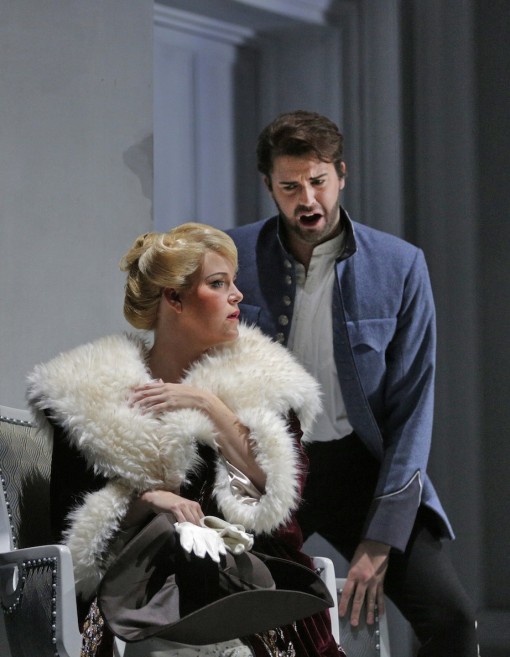Santa Fe Opera returns to its Strauss roots with a wry and admirable “Arabella”
On a blustery night on the mountaintop, Santa Fe Opera returned to its storied Richard Strauss roots with a largely successful performance of Arabella.
Strauss’s comedy concerns a once-wealthy Viennese family, now in arrears due to their father’s profligate ways, who are desperately trying to wed their elder daughter Arabella to a rich suitor to change their fortunes. Conveniently, Arabella meets and falls instantly in love with the wealthy Mandryka. However, her sister Zdenka’s misguided attempt to console the rejected Matteo in a midnight assignation leads to a misinterpreted overheard conversation and impending disaster, throwing Arabella’s betrothal and her family’s financial plans into chaos.
Arabella is sometimes regarded as Strauss’s ill-fated attempt to recapture some of the success of Rosenkavalier, with another upper-class milieu and blend of wistful elegance and witty romantic comedy. If not quite on that level of musical inspiration or popularity, Arabella is an enjoyable work in its own right, offering humorous situations and sophisticated lyricism in the composer’s most attractive style.
Santa Fe’s production, heard Wednesday night, delivered almost across the board. With Sir Andrew Davis in the pit, Strauss’s rhapsodic score was in excellent hands and the large cast was impressive in both major and minor roles.
The wild card of the evening was Erin Wall in the title role. At this second performance, Wall still didn’t appear comfortable or entirely well-suited to the role of the beautiful, independent-minded Arabella. Rarely smiling in the first act and failing to convey much charisma or sensual allure, it was hard to understand exactly what about this woman was driving Vienna’s young men into a frenzy. Her soprano is stronger on volume than richness and amplitude, and the kind of plush, luxuriant resplendence needed to ride Strauss’s big, arching melodies was lacking.
Both her characterization and vocalism improved as the evening unfolded. She brought a touching hushed tenderness to her duet with Mandryka, and sang with grace and refined feeling in Act 3, pulling off the long reconciliation scene effectively. But Arabella doesn’t seem a suitable role for the soprano, at least not at this stage of her career.
Mark Delavan so completely inhabited the role of Arabella’s wealthy Croatian suitor that for this production the opera could well be renamed Mandryka. His many Wagner roles seem to be taking a toll, with Delavan running out of steam by the final scene, but even the worn edge to his baritone suited the role of the gauche but sincere rustic who genuinely loves Arabella. He delivered an energetic performance, singing with sensitivity in the intimate moments as well as bringing righteous fury to his suspicions of Arabella’s inconstancy. Delavan was a hoot in the ball scene as Mandryka’s mounting hurt and frustration lead him to drown his sorrows by throwing back more champagne, jumping on tables and aggressively turning his attentions to Fiakermilli.
Heidi Stober provided a fine comic turn as Zdenka, Arabella’s melodramatic, cross-dressing sister, whose attraction to Matteo and duplicitous midnight tryst set the household spinning.
Arabella’s suitors proved an uncommonly strong lot. Brian Jagde was a hearty, big- voiced Elemer. Zach Borichevsky was equally robust vocally and cut a tall, dashing figure as the tortured Matteo. Jonathan Michie and Joseph Beutel, rounded out the admirers as Dominik and Lamoral, respectively.
Victoria Livengood and Dale Travis etched finally drawn comic portraits of Arabella’s petit-bourgeois parents. Kiri Deonarine provided worthy high-flying brilliance in Fiakermilli’s Zerbinetta-like coloratura.
This minimalist coproduction with the Canadian Opera Company and Minnesota Opera didn’t offer much in the way of elegance or eye bling. Still, Tobias Hoheisel’s spare blue-gray scenic design conveyed the down-at-heels situation of the Waldners, and the curved rotating sets proved functional and efficient.
Director Tim Albery offered a seminar in staging this tricky, talky work, capturing that peculiarly Straussian world between wry social satire and genuine drama. Albery’s fluent, understated blocking and movements for the large cast deftly avoided awkward longueurs throughout the evening.
Davis is one of our finest Strauss conductors and provided wholly idiomatic direction, pointing lyric climaxes without overpowering the singers and illuminating every conversational twist and turn of this witty, effervescent score.
Arabella continues through August 23. santafeopera.org
